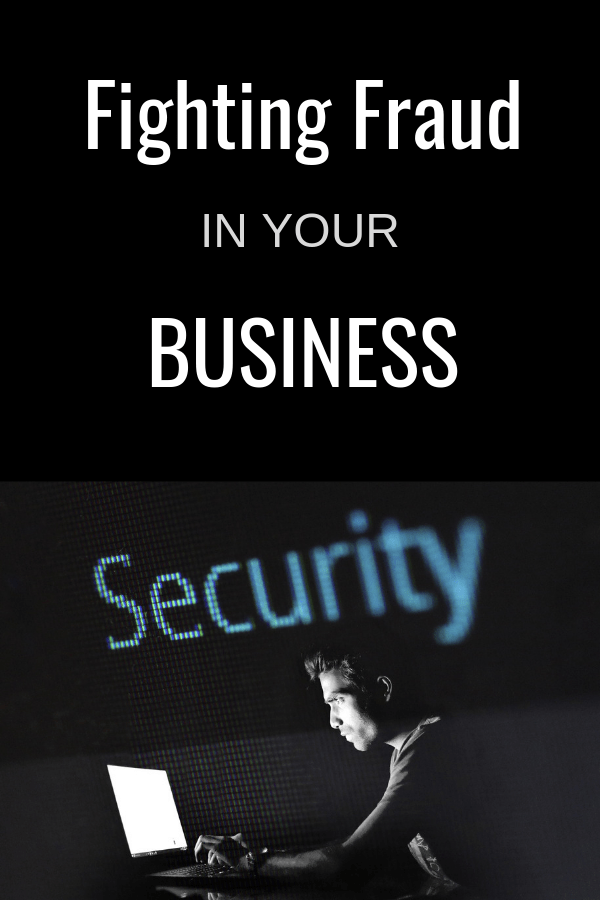Fraud is the most common crime committed against businesses. It occurs when an individual or a company deliberately deceives you for their own personal or financial gain. This could involve stealing someone else’s identity or making false accusations. There are so many forms of fraud – here are just four of the main types of fraud and how you can defend your business against them.

Business identity theft
Identity theft is one of the most common forms of fraud. Many fraudsters will try to steal the identity of a company for their own gain – this could include using bank details to gain access to company bank accounts, posing as the company in order to swindle money from customers or posing as a company simply to destroy their reputation. This can all be hugely damaging to your business.
In order to steal bank details, fraudsters will often try to pose as your bank, a supplier or the tax office. They may send an official-looking email asking you to confirm bank details or they may phone you up claiming to be your bank. You should make it a rule to never give such details over the phone or via email – a bank will usually ask you to come into your physical branch and billing companies will usually direct you to a form on their official website. When it comes to dodgy emails, always check the email address and consider putting in place email screening software that may be able to detect if information is not to be trusted. As for counterfeit phonecalls, many modern phones allow you to view the caller’s number which you can always then look up online.
Stealing a company’s brand can be a little harder to guard against. Fraudsters may steal a company’s brand in a number of ways such as using a copy of your website to attract customers or wearing branded uniforms that match yours. Trademarking your brand is a great way to legally protect yourself from this kind of identity theft (although you may find that your website content is already protected under the Digital Millennium Copyright Act). In most cases, you’re best hiring a lawyer to deal with these cases – it’s often easy to win cases such as this if you have proof you had nothing to do with it.
Customer fraud
You should also be careful of fraudulent customers – these are customers that will try to exploit your services through deception. This could include making false negligence claims, lying about personal details or posing as other customers.
False negligence claims are one of the biggest headaches for businesses. This could include a customer claiming that you injured them when you didn’t or it could include a customer trying to make a refund for a faultless product that they claim is defective. There are numerous ways to protect against these kinds of crooked customers such as putting CCTV in your premises (this can catch out false injury claims), putting carefully written contracts in place (having an agreement in writing is always useful) and using signage (a wet floor sign can warn customers that a floor is wet – if they fall over in a deliberate attempt to gain compensation, they can’t then blame you if signage was provided).
When it comes to fraudulent customers using fake or stolen details, screening measures can be a great method of prevention. Credit checks on customers can be a great way of checking customers’ backgrounds – if a customer is lying about their personal details, this will flag up during a credit check. Many companies also use customer passwords, identity cards and even facial recognition when it comes to accessing very sensitive data or gaining access to exclusive areas (some bars now use facial recognition on entry to check ID is valid!). As an extra measure, you can also take out insurance such as a direct debit guarantee. If it turns out a customer is using someone else’s stolen card details, this type of insurance could help to provide financial cover.
Contractor fraud
When working with contractors, you also need to have your wits about you. Some fraudsters will pose as a business-to-business contractor, charging companies in advance only to never follow through with the work. Others may try to catch you out with hidden fees that were never part of an initial agreement, claiming that you did agree to them.
There are lots of precautions that you can take to guard yourself in these situations. The first is to always thoroughly research contractors before taking them on. Online customer reviews can be a big giveaway as to whether a company is trustworthy. Some companies may try to use fake reviews, but these are usually easy to spot as they tend to be simply written and all published on the same date as a quick cover-up. In-person recommendations from people you trust can also be valuable.
When it comes to paying contractors large amounts, be wary of contractors that want all the money upfront. Most genuine contractors will ask for a small deposit to protect themselves, but you don’t want to be paying the whole amount upfront if it’s a huge amount of money. Part-paying on credit card could be worthwhile – most credit card lenders will pay compensation if it turns out you are scammed, making it a good insurance strategy.
Finally always make sure that contractors have a written contract in place. This will ensure that you know what you’re agreeing to and will give you more evidence to make a claim if you think a company is breaking your initial agreement.
Employee fraud
When hiring employees, you should also be wary of fraud. Some employees will provide fake details on their resume in order to land the job. This may not be for malicious purposes – it may be that they simply really want the job, however it’s unlikely you’ll want to trust someone who has deceived you like this and whose lack of qualifications could make them a liability. You then have the real crooks to look out for – these types of applicants may be hoping to gain access to your company to steal insider information or sabotage your company.
Your best method of defence against fraudulent employees is to always screen them. Getting references from past employees and running backgrounds checks can ensure that an employee really is who they say they are and that they haven’t got a criminal background.
You should also never share sensitive information with new recruits who you don’t yet trust. Only your closest associates should have access to information such as bank details.
On top of new recruits, it’s worth also protecting your company against ex-employees who may leak information out. Make sure to cancel or change any old employee passwords after a staff member has left – you don’t want an outsider getting hold of this information and accessing your data by posing as an employee.

- This post has been written by an outside source – See Disclosure Policy


